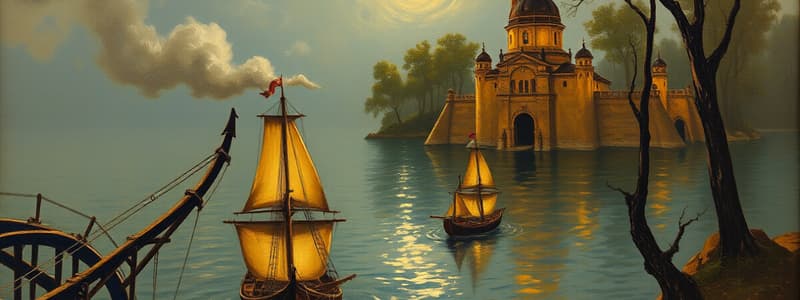Podcast
Questions and Answers
What was a significant aspect of medical practice in medieval Europe?
What was a significant aspect of medical practice in medieval Europe?
- Reliance on scientific methods
- Focus on sanitation and hygiene
- Use of modern medications
- Diagnosis through urine inspection (correct)
Which civilization is known for its natural basis of medicine, focusing on symptoms?
Which civilization is known for its natural basis of medicine, focusing on symptoms?
- Europe
- Aztec
- India (correct)
- Mayan
What mathematical concept was notably utilized in pre-Columbian America?
What mathematical concept was notably utilized in pre-Columbian America?
- Binary system
- Imaginary numbers
- Zero and decimal notations (correct)
- Fibonacci sequence
Which civilization is associated with significant advancements in metallurgy?
Which civilization is associated with significant advancements in metallurgy?
What marks the beginning of the Scientific Revolution?
What marks the beginning of the Scientific Revolution?
What was a primary function of high temples built by pre-Columbian civilizations?
What was a primary function of high temples built by pre-Columbian civilizations?
Which agricultural practice was common among the Incas?
Which agricultural practice was common among the Incas?
What was the common calendar year length established by both the Mayans and Aztecs?
What was the common calendar year length established by both the Mayans and Aztecs?
What major agricultural development began along the Huang Ho and Yangtze Rivers?
What major agricultural development began along the Huang Ho and Yangtze Rivers?
Which technological advancement is NOT mentioned as a major Chinese development during the Middle Ages?
Which technological advancement is NOT mentioned as a major Chinese development during the Middle Ages?
What was a significant feature of the feudal system developed in Europe?
What was a significant feature of the feudal system developed in Europe?
Which of the following universities was established first in Europe?
Which of the following universities was established first in Europe?
Which of the following advancements is associated with Chinese mathematics?
Which of the following advancements is associated with Chinese mathematics?
What model did Chinese astronomers develop related to timekeeping?
What model did Chinese astronomers develop related to timekeeping?
Which Chinese invention is related to engineering and construction?
Which Chinese invention is related to engineering and construction?
Which development featured prominently in European technology during the Middle Ages?
Which development featured prominently in European technology during the Middle Ages?
Flashcards are hidden until you start studying
Study Notes
China: Agriculture and Economy
- Farming initiated in the Huang Ho and Yangtze Rivers.
- Large-scale silk production commenced, enhancing economic activity.
- Bronze production techniques advanced significantly.
China: Astronomy
- Development of calendars with 365¼ days per year.
- Circles were divided into 365¼ degrees for precision in measurements.
- Comprehensive cataloging of stars, planets, comets, meteors, and eclipses.
- Various models of the universe were proposed and discussed.
China: Mathematics
- Introduction of decimal number expression.
- Techniques for determining square roots were established.
- Sliding calipers became widely utilized in various crafts.
- Solutions for cubic, quadratic, and intermediate equations were formulated.
Major Technological Advancements in China
- Innovations include paper, seismographs, and animal harnesses.
- Development of water power, mechanical clocks, and hydraulic engineering.
- Invention of wheelbarrow, gunpowder, printing press, magnetic compass, and stern-post rudder.
Europe: Economy
- The feudal system fully developed, shaping economic history.
- Economic activities relied on local agriculture and handicraft production.
- Society structured hierarchically: peasants, lords, clerical figures, overlords, kings, bishops, and the pope or emperor.
Europe: Education
- Establishment of cathedral schools transitioning into universities.
- Notable universities arose in Paris, Oxford, Cambridge, Padua, St. Andrews, Naples, Salamanca, Prague, and Vienna.
Major Discoveries and Inventions in Europe
- Key innovations included horse-collars, clocks, magnetic compasses, water-mills, windmills, lenses, gunpowder, and the printing press.
Europe: Medicine
- Flourishing of superstition and dogmatism affecting medical practices.
- Limited diagnostic methods, primarily urine inspection.
- Medical therapies incorporated magic, prayer, charms, faith healing, and herbal remedies, alongside poor hygiene standards.
India: Science and Medicine
- Accumulated knowledge on diseases, drugs, and astronomy.
- Calendar system established with 12 months totaling 360 days.
- Practices in solving equations and the use of zero and decimal values.
- Diagnosis based on symptoms, leading to naturalistic medical approaches.
- Advances made in metallurgy.
Pre-Columbian America: Mayan Civilization
- Economy based on the use of cocoa beans as currency.
- Developed a solar calendar of 365 days spread over 18 months.
- Used decimal notation with zero depicted as an oval shape.
Pre-Columbian America: Aztec Civilization
- Construction of high temples for worship of deities.
- Similar use of decimal notation and a 365-day social calendar.
Pre-Columbian America: Inca Civilization
- Farming utilized terraced fields with irrigation canals.
- Cultivation of chili peppers and avocados.
- Clothing produced from llama and alpaca wool, employing a 365-day calendar and decimal counting system.
Scientific Revolution (1440-1690 AD)
- Marked the emergence of modern science, transforming societal views on nature.
- Significant advancements made in mathematics, physics, astronomy, biology, and chemistry.
- Period defined as spanning from Copernicus to Newton, initiating a paradigm shift in scientific understanding.
Studying That Suits You
Use AI to generate personalized quizzes and flashcards to suit your learning preferences.




